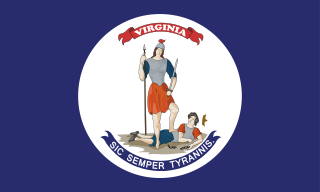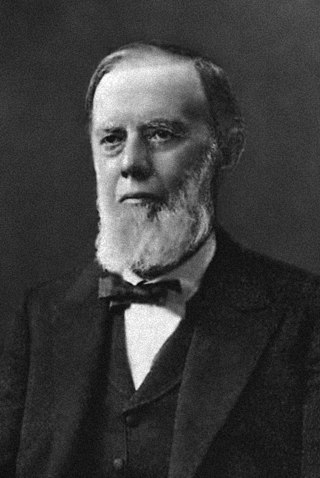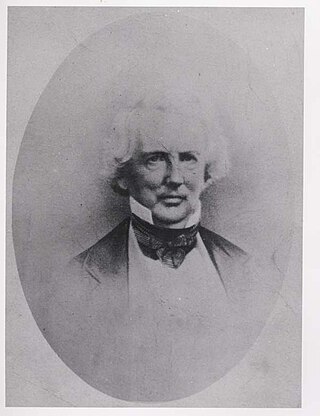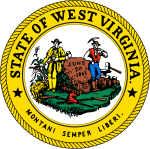
Arthur Ingram Boreman was an American lawyer, politician and judge who helped found the U.S. state of West Virginia. Raised in Tyler County, West Virginia, he served as the state's first Governor, and a United States senator, as well as represented Wood County in the Virginia House of Delegates, and served as a circuit judge before and after his federal service.

The 1861 Wheeling Convention was an assembly of Virginia Southern Unionist delegates from the northwestern counties of Virginia, aimed at repealing the Ordinance of Secession, which had been approved by referendum, subject to a vote.

Waitman Thomas Willey was an American lawyer and politician from Morgantown, West Virginia. One of the founders of the state of West Virginia during the American Civil War, he served in the United States Senate representing first the Restored Government of Virginia and became one of the new state of West Virginia's first two senators. He is one of only two people in U.S. History to represent more than one state in the U.S. Senate, the other being James Shields.

The Virginia Conventions have been the assemblies of delegates elected for the purpose of establishing constitutions of fundamental law for the Commonwealth of Virginia superior to General Assembly legislation. Their constitutions and subsequent amendments span four centuries across the territory of modern-day Virginia, West Virginia and Kentucky.

The U.S. state of West Virginia was formed out of western Virginia and added to the Union as a direct result of the American Civil War, in which it became the only modern state to have declared its independence from the Confederacy. In the summer of 1861, Union troops, which included a number of newly formed Western Virginia regiments, under General George McClellan, drove off Confederate troops under General Robert E. Lee. This essentially freed Unionists in the northwestern counties of Virginia to form a functioning government of their own as a result of the Wheeling Convention. Before the admission of West Virginia as a state, the government in Wheeling formally claimed jurisdiction over all of Virginia, although from its creation it was firmly committed to the formation of a separate state.

Peter Godwin Van Winkle was an American lawyer, businessman and politician. For many years a leading officer of the Northwestern Virginia Railroad, he became one of the founders of West Virginia and a United States senator.

The American state of Virginia became a prominent part of the Confederacy when it joined during the American Civil War. As a Southern slave-holding state, Virginia held the state convention to deal with the secession crisis, and voted against secession on April 4, 1861. Opinion shifted after the Battle of Fort Sumter on April 12, and April 15, when U.S. President Abraham Lincoln called for troops from all states still in the Union to put down the rebellion. For all practical purposes, Virginia joined the Confederacy on April 17, though secession was not officially ratified until May 23. A Unionist government was established in Wheeling and the new state of West Virginia was created by an act of Congress from 50 counties of western Virginia, making it the only state to lose territory as a consequence of the war. Unionism was indeed strong also in other parts of the State, and during the war the Restored Government of Virginia was created as rival to the Confederate Government of Virginia, making it one of the states to have 2 governments during the Civil War.

William Gay Brown Sr. was a nineteenth-century politician and lawyer from Virginia, who was twice elected to the Virginia General Assembly and thrice to the U.S. House of Representatives. He also served at the Virginia Constitutional Convention of 1850 and later opposed secession at the Virginia Secession Convention of 1861. A leading Unconditional Unionist during the American Civil War, he became one of the founders of West Virginia.

The RestoredGovernment of Virginia was the Unionist government of Virginia during the American Civil War (1861–1865) in opposition to the government which had approved Virginia's seceding from the United States and joining the new Confederate States of America. Each state government regarded the other as illegitimate. The Restored Government attempted to assume de facto control of the Commonwealth's northwest with the help of the Union Army but was only partly successful. It raised Union regiments from local volunteers but depended upon recruits from Pennsylvania and Ohio to fulfill its commitments. It administered this territory until, with its approval, the area became part of West Virginia in mid-1863.

John Jay Jackson Jr. was an American lawyer, Whig politician, United States District Judge and, later, the first judge of the United States District Court for the District of West Virginia. He ended his career as the first judge of the United States District Court for the Northern District of West Virginia.

The 1868–69 United States Senate elections were held on various dates in various states. As these U.S. Senate elections were prior to the ratification of the Seventeenth Amendment in 1913, senators were chosen by state legislatures. Senators were elected over a wide range of time throughout 1868 and 1869, and a seat may have been filled months late or remained vacant due to legislative deadlock. In these elections, terms were up for the senators in Class 1.
Virginia v. West Virginia, 78 U.S. 39 (1871), is a 6-3 ruling by the Supreme Court of the United States that held that if a governor has discretion in the conduct of the election, the legislature is bound by his action and cannot undo the results based on fraud. The Court implicitly affirmed that the breakaway Virginia counties had received the necessary consent of both the Commonwealth of Virginia and the United States Congress to become a separate U.S. state. The Court also explicitly held that Berkeley County and Jefferson County were part of the new State of West Virginia.

The 1862–63 United States Senate elections were held on various dates in various states, occurring during the American Civil War. As these U.S. Senate elections were prior to the ratification of the Seventeenth Amendment in 1913, senators were chosen by state legislatures. Senators were elected over a wide range of time throughout 1862 and 1863, and a seat may have been filled months late or remained vacant due to legislative deadlock. In these elections, terms were up for the senators in Class 1.
James Sanders Wheat was the Attorney General of Virginia in Union held territory from 1861 to 1863.

The 1890 South Dakota gubernatorial election was held on November 4, 1890. Incumbent Republican Governor Arthur C. Mellette ran for re-election to a second term. He was challenged in the general election by State Surveyor General Maris Taylor, the Democratic nominee, and Henry A. Loucks, the President of the South Dakota Farmers' Alliance and the Independent Party nominee. In part because the left-leaning vote was split, Mellette won re-election, but by a significantly reduced margin, winning a weak plurality with just 44% of the vote. Loucks beat out Maris for second place, receiving 32% of the vote to Taylor's 24%.

Edwin Maxwell was an American lawyer, judge, and politician in the U.S. state of West Virginia. Maxwell served as Attorney General of West Virginia in 1866 and was an associate justice of the Supreme Court of Appeals of West Virginia from 1867 until 1872. He was elected to the West Virginia Senate and the West Virginia House of Delegates.

The Virginia Secession Convention of 1861 was called in Richmond to determine whether Virginia would secede from the United States, govern the state during a state of emergency, and write a new Constitution for Virginia, which was subsequently voted down in a referendum under the Confederate Government.
Daniel Edward Frost was an American journalist, politician and soldier who twice served in the Virginia House of Delegates before the American Civil War. He helped found the state of West Virginia at the Wheeling Convention where he represented Jackson County and served as Speaker of the House of Delegates for the Virginia General Assembly at Wheeling, before he died fighting for the Union while leading the 11th West Virginia Infantry Regiment.
Granville Davisson Hall was an American journalist, businessman and politician who helped found the state of West Virginia during the American Civil War. He served as the Secretary of State of West Virginia and as the private secretary of the first governor, Arthur Boreman, and eventually wrote seven books, including The Rending of Virginia to counteract the growing Lost Cause myth. After the Civil War, Hall became involved in the railroad industry in Kentucky, eventually becoming President of the Louisville and Nashville Railroad, but later moved to Glencoe, Illinois where he continued writing and served as the village clerk.
On June 20, 1863 the U.S. government created a new state from 50 western counties of Virginia to be named "West Virginia". This was done on behalf of a Unionist government in Wheeling, Virginia, approved by Congress and President Lincoln, though it was done with a low participation of the citizens within the new state. There remained a large number of counties and citizens who still considered themselves as part of Virginia and the Confederacy which, in turn, considered the new state as part of Virginia and the Confederacy. In 1861 the 50 counties contained a population of 355,544 whites, 2,782 freemen, 18,371 slaves, 79,515 voters and 67,721 men of military age. West Virginia was the 6th most contested state during the war, with 632 battles, engagements, actions and skirmishes.
















